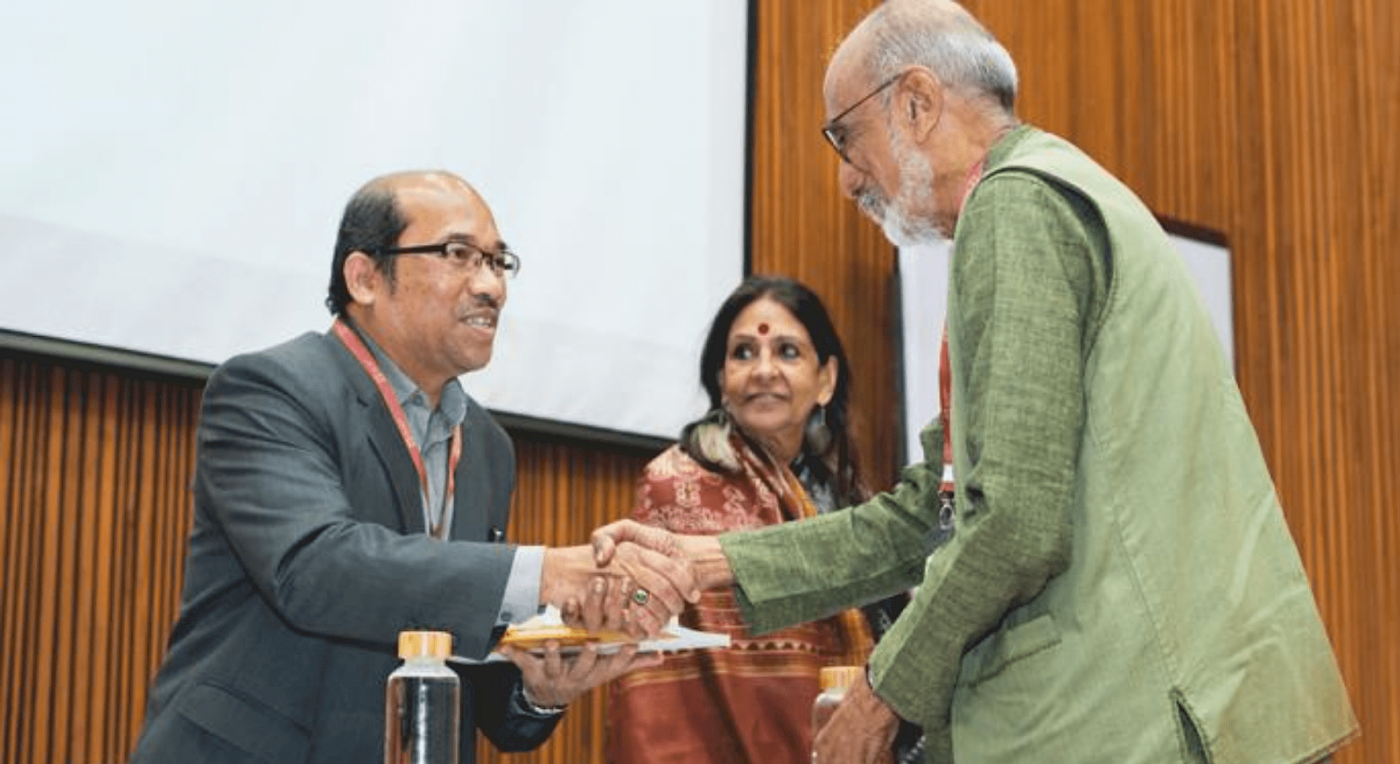3rd International Conference on Heritage Management Education and Practice

International Workshop on Educational Transformations and Societal Change in Liberalising India
The School of Arts and Sciences at Ahmedabad University hosted a three-day international workshop on Educational Transformations and Societal Change in Liberalising India from 9-11 January 2020. Situating the changes emergent in the educational sector within the societal transformations accompanying liberalisation, the workshop focused attention on shifts across multiple scales, including the institutional and the intimate. Accordingly, the two broad themes of the workshop were Devolution of Governance and Democratisation of Aspiration.
The workshop was funded by a Spencer Foundation Conference Grant awarded to Dr Leya Mathew and Dr Mary Ann Chacko of the School of Arts and Sciences, along with Dr Karishma Desai, Rutgers University; Dr R Maithreyi, formerly at the Center for Budget and Policy Studies, Bengaluru; and Dr Vidya Subramanian, Tata Institute of Social Sciences, Mumbai. In order to comprehensively attend to the varied and complex nature of societal transformations, the workshop brought together education scholars, economists, anthropologists, geographers and historians who have advanced our understanding of societal change in India.
The workshop was designed to be an intimate and in-depth ‘field-building’ exercise. It, therefore, had 28 participants comprising of established scholars as well as advanced doctoral students and early career scholars from universities in India. The participants presented papers, engaged in large and small group deliberations and participated in inter-generational mentoring sessions to explore the dramatic and everyday ways in which liberalisation has re-structured social institutions and subjectivities in India.
The workshop began with an introductory session that mapped the landscape of educational research in India. Padma Sarangapani from TISS Mumbai, K. Laxminarayana from Hyderabad Central University and Amman Madan from Azim Premji University shared succinctly from their long and rich engagements with educational research, policymaking, and practice. This session introduced the interdisciplinary audience of the workshop to the debates within educational research that the workshop was responding to.
The introductory panel was followed by thematic conversations around Devolution of Governance. The first sub-theme of Development Discourses and Subject Formation saw discussions around the historical and geographical specificity of neoliberalisation. Analyses of Life Skills programmes in Karnataka, the Mahila Samakhya program, the census’s approach to counting disability, the Student Police Cadet programme in Kerala, macro-analyses of social stratification and more intimate autobiographical introspections on the social justice objectives of university education provided a rich array of locations from which to compare the subjectivities that are constituted by and constitute neoliberal development. Additionally, a historical perspective on citizenship education cautioned participants to attend to longer histories of inequality and power. Participants in this session included R. Maithreyi, Center for Budget and Policy Studies; Aradhana Sharma, Wesleyan University; Kimberly Fernandes, University of Pennsylvania; Amman Madan, Azim Premji University; Asim Siddiqui, Azim Premji University; Mary Ann Chacko, Ahmedabad University; and Manish Jain, Ambedkar University.
The second sub-theme focused more specifically on the Proliferation of Infrastructures. Examining the role of diverse kinds of infrastructures in organising the relationships between state and society, participants brought in perspectives from mining and development in Orissa, multi-national educational businesses in Hyderabad, educational policy making infrastructures from the 1990s, the Sarva Shiksha Abhiyan program in West Bengal, the new premium on digitisation, data generation and documentation in higher educational institutions, and the complicated, multi-party schooling infrastructures in the National Capital Region as well as those available to migrant children in Bengaluru. Swagato Sarkar, Jindal School of Government & Public Policy; Sangeeta Kamat, University of Massachusetts at Amherst; Padma Sarangapani, Tata Institute of Social Sciences; Vijita Rajan, University of Delhi; Monika Banerjee, Institute of Social Studies Trust; Rashmi M., Government First Grade College, Kodagu and Vidya Subramanian, Tata Institute of Social Sciences presented from their research to anchor the discussions around infrastructural transformations underway in contemporary India and its implications for education.
The second broad theme on the Pedagogies and Politics of Aspiration mapped the diversity of aspirations and offered a typology of the aspirational landscape of liberalisation. Contemporary and historical perspectives included the aspirations of the state for non-elites, specifically the much publicised Skill India programme as well as more mundane programmes that target lower caste families in state-funded schools in Tamil Nadu and the historical aspirations of Christian missionaries for slave-caste families in erstwhile Travancore. While these presentations illuminated the limits of state aspirations for non-elites, the strategies, aspirations and practices that locate training schools for women wrestlers in Haryana, Dalit aspirations at the Hyderabad Central University and in social welfare hostels in Karnataka, and Dalit and Muslim women’s investments in futures for themselves laid out aspiration as a political practice that unsettled enduring inequalities. The conversations and perspectives in this panel were directed by the presentations of K. Laxminarayana, University of Hyderabad; Smruthi Bala Kannan, Rutgers, State University of New Jersey; Divya Kannan, Shiv Nadar University; Rupal Oza, Hunter College, CUNY; Karishma Desai, Rutgers, State University of New Jersey; Carol Upadhya, National Institute of Advanced Studies, Bangalore; Savita Suresh, National Institute of Advanced Studies, Bangalore and Hem Borker, Jamia Millia Islamia, Delhi.
The last set of conversations, again around aspirations, provided a more expanded view of the politics of aspiration. Ritty Lukose, New York University, set up the concluding panel by drawing out the arc of thirty years of liberalisation, prompting retrospectives from established scholars who have tracked the transformations of liberalisation in its formative and more mature decades. Following, the specificity of aspirational locations were highlighted. The aspirations of technocratic, NRI ‘brown saviours’ at the helm of philanthropic educational ventures and those of privileged policymakers at national and state levels differ substantively from those of women belonging to the Dalit middle classes and the erstwhile criminal tribes. Paying attention to the social locations from which aspirations emanate as well as the practices and resources mobilised through aspirations, Nivedita N., Jawaharlal Nehru University; Venkateswarlu Yerukala, University of Hyderabad; Ritty Lukose, New York University; Arjun Shankar, Colgate University; Sanal Mohan, Kerala Council for Historical Research and Leya Mathew, Ahmedabad University anchored the broader discussions around aspiration.
While all participants presented papers, the format of the workshop intentionally veered away from the familiar question and answer sessions following panel presentations. Instead, small group deliberations were designed to encourage participatory theorisations. Mentoring was yet another much-appreciated aspect of the workshop. It was designed to be an intergenerational space with opportunities for formal and informal mentoring. Faculty typically mentor students. Here early career scholars and advanced doctoral students received mentoring. Participants spoke of the pressure academics feel to perform expertise and emphasised the need for spaces like these that foster academic nurturing



